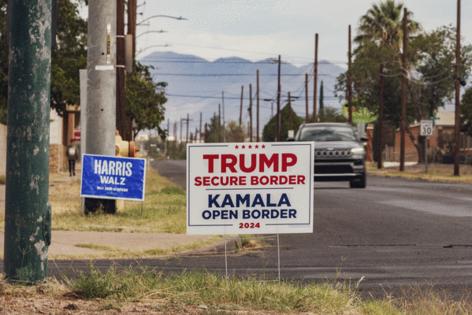POINT: Even when on target, polls hurt our democracy
Published in Op Eds
Americans are blessed to have the First Amendment, with its prohibitions against government abridging freedom of speech and of the press.
Yet, freedom comes with responsibility. Our rampant polling may fill Americans’ hunger to know what might happen before we vote, but it’s a significant contributor to the deterioration of our democracy. Although we are unable to outlaw it, we can take more responsibility for its effect.
Polling’s problem isn’t quality. On average, pollsters typically get races within a few percentage points. We can generally trust polls as long as we realize that a slight lead isn’t a guarantee of victory.
The problem is polling's effect on the quality of our political discourse and our openness to treating more candidates seriously. Take this year. A deafening drumbeat of polling virtually silenced what we might have learned about candidates.
It started before the primaries. Incumbent Joe Biden dominated among Democrats and his predecessor, Donald Trump, among Republicans. They were historically unpopular, but their big leads over their competition depressed interest in the primaries.
Biden and Trump refused to debate their challengers. Still, primary voters forgave them; if polls showed the results were a foregone conclusion, why worry about debates even if they would have allowed voters to better assess their readiness and engage in more policy discussion within their parties?
Democrats had a rude awakening with Biden’s poor debate performance against Trump in June. Biden’s candidacy was in trouble, but the debate’s relatively modest effect on polls kept him in the race for weeks. When he finally did withdraw, Kamala Harris immediately validated his decision, with Democrats having a surge of hope.
Would Harris be better positioned now if she had had to win a “blitz primary” where voters could have learned more about her and her priorities? We’ll never know — polls showing she was the front-runner justified her appointment.
By September, the combination of polls and relentless attacks had reduced potential independent and minor party candidates to the margins. The most reliably brutal effect of polling is to sideline minor parties except for their “spoiler impact.”
Now, it’s all about polls in the dully familiar swing states. Polls justify why the candidates spend nearly all their time there and why billions will be spent on the relatively few swing voters who will decide who wins them.
In winner-take-all elections, campaigning only matters when results are in doubt. In Senate elections, Republicans seek an upset in Maryland, Democrats in Texas and Florida, and independents in Nebraska. But polls make them underdogs, and polls report that Senate control will likely hinge on whether Democratic incumbents can carry Ohio and Montana.
Of 435 House seats, only about 40 might change parties — and far fewer will. Polls again drive where resources go, depressing debate, competition and turnout everywhere.
Reliance on polling shortchanges meaningful discussion about issues and character. It ensures most of us know we’re only symbolic participants and nervous spectators in deciding control of the White House and Congress.
So what to do? Given the First Amendment, we can’t easily regulate polling any more than we can mandate shorter campaigning or limit how much billionaires can spend on influencing opinion. However, we can still take more personal responsibility.
First, we can tune out polls and reward journalists who focus on substance more than the horse race with our subscriptions and clicks.
Second, we can refuse to participate in polls, which creates greater uncertainty by making it harder to get a representative sample.
Third, we can back election reforms that put voters more in charge. Pollsters thrive on binary elections where voters pick only one candidate. But ranked-choice voting enables minor candidates to get a fair shake and incentivizes creative campaigning. Combining it with all-candidate primaries and multi-member districts will open up elections.
I’m generally trusting the polls this year — but eager for our collective work to reduce their influence.
____
ABOUT THE WRITER
Rob Richie is a co-founder and senior adviser of FairVote, a nonpartisan election reform organization. He wrote this for InsideSources.com.
___
©2024 Tribune Content Agency, LLC




























































Comments